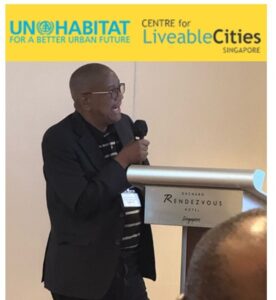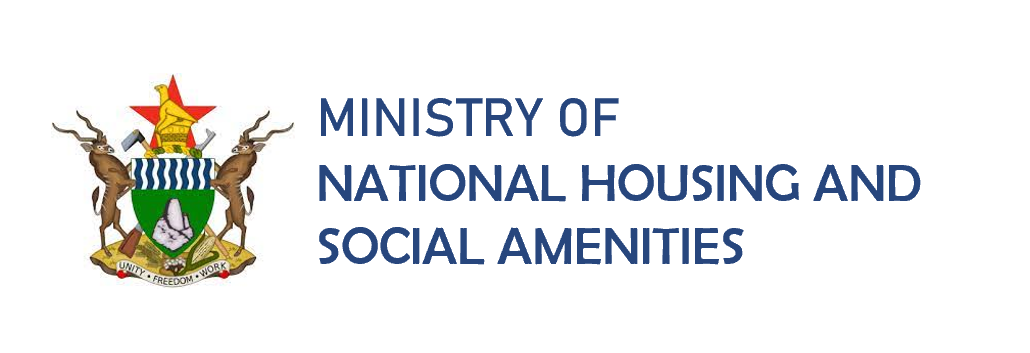
Lexton Taengwa Kuwanda – Director Rural Housing presenting on Regularisation & Sanitisation of Dysfunctional Settlements: Case of Harare South at the Singapore-UN-Habitat International Leaders in Urban Governance Programme (SGUNHiLUGP) held from 24 to 28 March.
Zimbabwe joined other African countries at the Singapore-UN-Habitat International Leaders in Urban Governance Programme (SGUNHiLUGP) held from 24 to 28 March. The meeting was convened by the Centre for Livable Cities (CLC), in partnership with the Ministry for Foreign Affairs (MFA) of Singapore under its Singapore Cooperation Programme (MFA SCP), and UN-Habitat. Director Rural Housing, Lexton Taengwa Kuwanda represented Zimbabwe at this crucial gathering meant to train and share experiences on urban governance.
In his address during the sessions, he explored regularisation and sanitisation of dysfunctional settlements with a focus on Harare South. Kuwanda provided a synopsis of the current situation in Harare South which is characterized by lack of roads, storm water drainage, water and sewer reticulation infrastructure. He stated that the indicated challenges emanated from the parceling of unserviced land, an area which Government is now seized with to ensure that no land is parceled out before requisite infrastructure is put in place. The Director also explored the regularization protocol which Government has initiated and provided its key outcomes mainly, orderly, functional and sustainable settlements, security of tenure through title deeds, enhanced public health and improved on and offsite infrastructure.
Making reference to the experiences of Singapore, the director explained that integrated planning and development in human settlements and community engagement for project buy-in and or ownership were the key ingredients of regularization of such settlements. He drew the attention of the meeting to an action plan with medium and long term action items. He explained that in the immediate future, actions like community sensitization and engagement, resource mobilization for infrastructure emplacement and institute development control measures within the settlement would be instituted.
Within the medium term, development of social amenities infrastructure, preparations for road constructions and water distribution and preparation of storm water and sewer management plan would be considered. In the long term, focus would dwell on review of detailed planning schemes, road constructions and water distribution and construction of storm water drainage and sewer network in the settlement. He also proposed a financing model structured on an infrastructure bond to provide resources for the programme. In terms of monitoring, Kuwanda indicated that government will come up with key performance indicators (KPI) as a tool. In measuring the success, he pointed out that the number of title deeds processed and issued, number of house with access to basic services and health outcomes (reduction in water borne diseases) will be used.
Key to note during the deliberations were the experiences shared by Windhoek, Namibia and Banjul, in the Gambia on country initiatives towards localizing SDGs an area which was acknowledged as lagging behind in many countries within the African continent.
Meanwhile, the four day meeting made reference to Singapore’s experience in nation building and drive towards sustainable urbanisation, through sharing of its urban practices and model of urban transformation as well as the cross-exchanges for peer learning of urban policies and planning and legislations. For Zimbabwe this will substantively augment governments’ pursuits and ambitions in alignment with the 2030 Agenda for Sustainable Development and its 17 Sustainable Development Goals (SDGs) and the New Urban Agenda.

